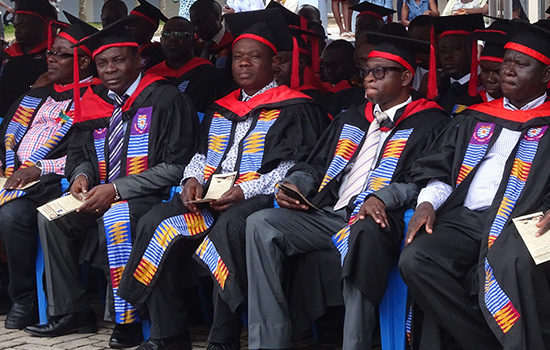A total of 2,021 Higher National Diploma and 168 Diploma in Public Administration who completed their studies in 2020 have been graduated by Koforidua Technical University (KTU) in the 17th congregation of the University.
Out of the total, 128 graduands obtained First Class, 1,038 graduands obtained Second Class Upper, 927 graduands obtained Second Class Lower. In the case of Automotive Engineering, 2 graduands had ‘Competent’ while 42 graduands had ‘Competent with Merit’. Those who obtained passes were 58.
The Vice-Chancellor of KTU Prof. David Kofi Essumang urged the graduands to leverage the knowledge acquired to contribute to the development of the country.
He said, the University currently has a student population of 8,924 made up of 1,515 BTech students, 6,457 HND students, and 952 Non-HND, professional and technical students. Of this total, 5,354 Students representing 60% are males and the remaining 3,572 students representing 40 % are females.
The Vice-Chancellor Prof. David Kofi Essumang announced that the Koforidua Technical University has secured approval to run four-year Bachelor of Technology programs in Mechatronics Engineering, Civil Engineering with options in – Structural Engineering, Transportation Engineering, Geotechnical Engineering, Material Engineering, Water Resource Engineering, and Welding & Fabrication Engineering, Electrical & Electronic Engineering with options in Power Systems Engineering, Telecommunication Engineering, Computer Engineering, Control and Instrumentation, Automotive Engineering, Biomedical Engineering, Medical Laboratory Science, Food Technology, Computer Science with options in – Computer Network Management, Artificial Intelligence & Robotics.
The Eastern Regional Minister Seth Kwame Acheampong said the unemployment rate continues to rise despite interventions by the government in creating more employment opportunities.
He, however, stated that the World Bank has identified entrepreneurship including apprenticeship, agribusiness, tourism, construction, and sports as key sectors that can offer employment opportunities to the Ghanaian youth.
“Entrepreneurial skills refer to the ingenuity of the individual to identify and utilize their talents to bridge the gap between school and the labor market so as to be self-reliant in the society. Thus students need to be equipped with entrepreneurial and innovative competencies to be self-reliant and relevant after graduation. Equipping the youth with employable skills empower them to be self-reliant and ready for the world of employment.”
Source: Mybryfmonline.com/Obed Ansah



















































